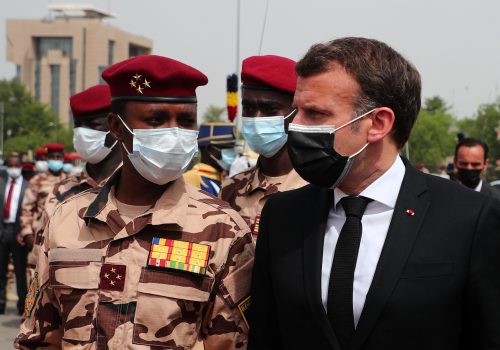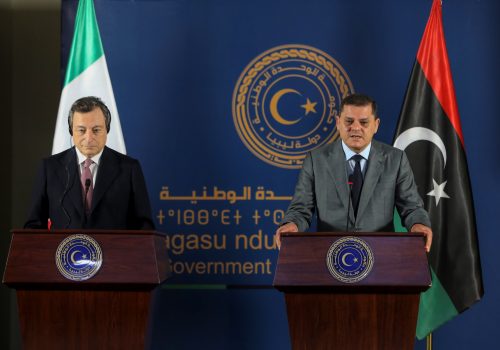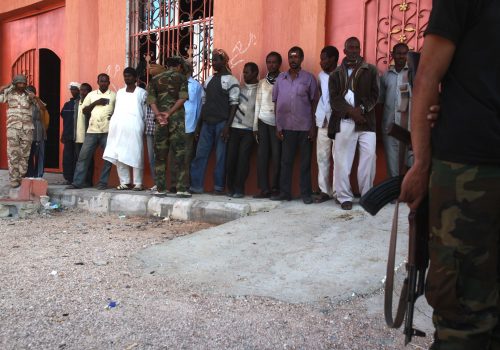Chairman of Libya’s High National Election Commission: Libya doesn’t have the right environment for a referendum
As Libya is coming closer to presidential and parliamentary elections on December 24, more obstacles could delay the polls. On October 17, the internationally-recognized Libyan Government of National Unity Prime Minister, Abdulhamed Dabaiba, reconstituted the board of Libyan Post Telecommunications and Information Technology Holding Company (LPTIC) and appointed Mohammed Bin Ayad as the new chairman, along with six new board members.
LPTIC is an essential institution in providing technical support to the High National Elections Commission (HNEC) during the elections process. The Tripoli-based HNEC is an independent body and solely responsible for setting mechanisms for candidacy, such as registering candidates, and conducting elections in Libya, including registering voters, accrediting observers and journalists, and tallying and announcing the final results.
It was established in 2012 by the National Transitional Council after the overthrow of the Muammar Gaddafi regime. The HNEC has conducted the 2012 General National Congress elections (a legislative authority), the 2014 Constitution Drafting Assembly elections, which elected sixty members to draft Libya’s new constitution, and the 2014 House of Representatives elections, a legislative body whose results weren’t accepted by all parties and have since put Libya in a political divide.
The HNEC is currently preparing for the December 24 polls, two crucial elections that will determine the next steps that Libya needs to take to reach stability. Thus, the sudden change in LPTIC leadership will cause a new political conflict and perhaps delay the upcoming vote.
Tahani Elmogrbi, a Libya expert, interviewed High National Election Commission Chairman Dr. Emad Al-Sayah on October 13 for the Atlantic Council’s North Africa Initiative, prior to the shakeup at the LPTIC.
TAHANI ELMOGRBI: Do you still expect to hold parliamentary and presidential elections on December 24?
EMAD AL-SAYAH: The date of December 24 is a date approved by politicians at the Libyan Political Dialogue Forum for holding the presidential and parliamentary elections and the technical date for implementing these elections is approved by the High National Elections Commission, which is the body technically responsible for implementing the electoral process in accordance with internationally-recognized standards and principles. Therefore, from our point of view, once we receive the electoral legislation by the House of Representatives (HoR), the date of December 24 has been achieved. The current issue now is related to the time periods needed for each stage of the electoral process and we will make sure that December 24 is the day of polling unless we violate international standards for the implementation of electoral processes.
TAHANI ELMOGRBI: Which elections will come first?
EMAD AL-SAYAH: Synchronization was one of the conditions that most political parties insisted on; that is, that the presidential and parliamentary elections be held at the same time. The HoR approved the holding of parliamentary elections in the second round of the presidential elections. Thus, HNEC will work on synchronizing the stages of the two processes, starting from the stage of accepting candidacy applications—through the stage of appeals—and ending with the stage of electoral campaigning. The polling date for the parliamentary elections is postponed to the second round of the presidential elections, which are thirty days apart from the first round of the presidential elections.
TAHANI ELMOGRBI: How will Libyan officials secure the elections in the country’s three regions?
EMAD AL-SAYAH: The security situation in Libya, in general, and the three regions is relatively stable because all political parties are awaiting the results of the electoral process scheduled for December 24. They are working to mobilize their capabilities to compete for seats in the two electoral processes. None of the political parties want to appear as an obstacle to the electoral process for fear of being within the range of international sanctions. There were some security incidents that involved outlawed armed groups, but they have nothing to do with the political process unless they are used by a political party that doesn’t want the political process and electoral process, in particular, to succeed. The almost complete consensus on holding these elections is the strongest security guarantor to secure the electoral process, but this won’t prevent the occurrence of some security breaches in some electoral districts. However, the final outcome won’t have an impact on creating new legislative and executive authorities working to address the Libyan crisis files.
TAHANI ELMOGRBI: There are many clashes between the House of Representatives and High State Council. Do you think this will affect the progress of the electoral process?
TAHANI ELMOGRBI: There are rumors that the Government of National Unity is attempting to delay the elections by appointing a new head of the Libyan Post Telecommunications and Information Technology Holding Company. What are your thoughts?
EMAD AL-SAYAH: The telecommunications and information technology sector is one of the main partners in our implementation of the electoral process and we rely on this sector heavily. The stability of the management of this sector will be positively reflected in our technical implementation of the electoral process. I don’t think that compromising the management of this sector will be in the interest of supporting the electoral process, and we hope the current government will focus on supporting the electoral process not only financially, but also through achieving stability in all relevant sectors to create an ideal and positive environment for the implementation of the electoral process.
TAHANI ELMOGRBI: Is there a possibility to hold a referendum on the constitution?
EMAD AL-SAYAH: The constitution referendum requires a stable political, economic, and social environment that enables all components of Libyan society to sit at one table and listen to each other in an atmosphere of confidence. This requirement isn’t presently available in the Libyan case and needs more efforts to ensure that the constitution is a factor of stability and not a factor of division and dissent that generates more crises. One of the priorities of the new legislative authority that the December 24 elections will produce is to consider the current draft constitution and discuss the existing differences over its articles and the possibility of putting it to a referendum after agreeing on its content.
Tahani Elmogrbi is a Libya expert and an independent researcher focusing on democracy and governance development in MENA region.
Further reading
Fri, Apr 30, 2021
Déby’s death: A microcosm of the flaws of French foreign policy in Libya
MENASource By Emadeddin Badi
Far from being the sole architect of his premature death, the conditions that led to Chadian President Idriss Déby’s passing are also a direct byproduct of the myopic policies of his main Western ally—France—in neighboring Libya.
Fri, Apr 16, 2021
Italy found its way back into Libya
MENASource By Karim Mezran, Alissa Pavia
Italian Prime Minister Mario Draghi’s visit to Libya is a big step for renewing Italy’s role in Libya and the wider Mediterranean, one that should not be overlooked.
Fri, May 21, 2021
Libya has a mercenaries problem. It’s time for the international community to step up.
MENASource By
One of the darker realities of the war in Libya is that the conflict (now in its eleventh year) is powered by layers of actors from outside the contested territory. Libyans have been killed and their country ravaged by foreign soldiers of fortune.
Image: Emad Al-Sayah, Chairman of Libya's High National Election Commission (HNEC), speaks during a news conference in Tripoli, Libya December 6, 2018. REUTERS/Hani Amara/File Photo


